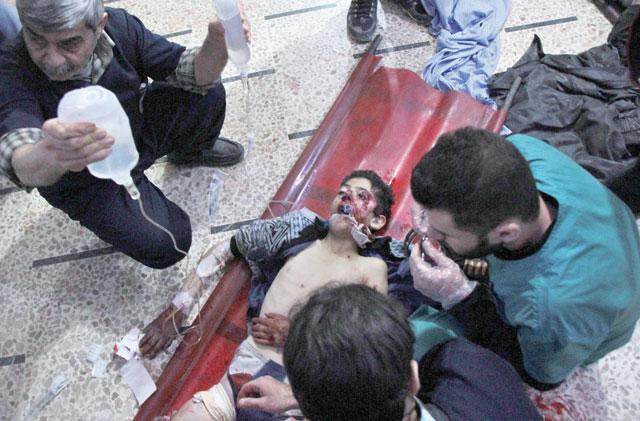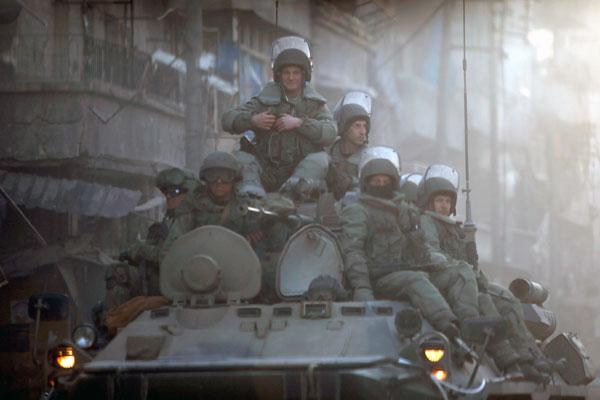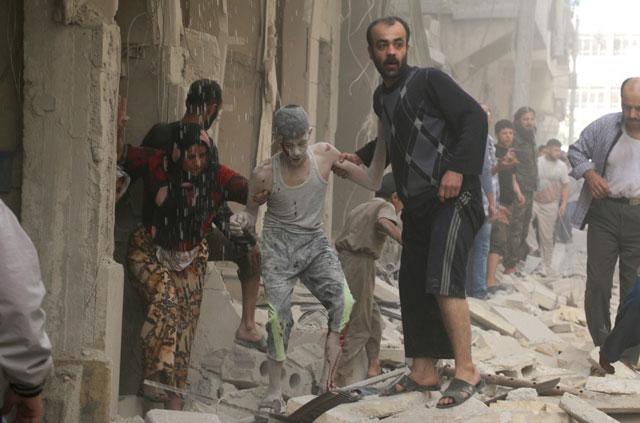You are here
UN aims to restart Syria talks with unified opposition
By AFP - Nov 27,2017 - Last updated at Nov 27,2017

A Syrian child receives medical attention at a makeshift clinic following a reported air strike by Syrian government forces, in the rebel-held town of Douma in Syria’s eastern Ghouta region, on Sunday (AFP photo by Hamza Al Ajweh)
GENEVA — The United Nations will try to revitalise its flagging Syria peace process this week, buoyed by the prospect of hosting a unified opposition delegation in Geneva for the first time.
The UN-brokered talks to end the war that has killed more than 340,000 people since 2011 have achieved little through seven previous rounds, leaving them overshadowed by separate diplomatic pushes led Russia, Turkey and Iran.
UN mediator Staffan de Mistura, who describes himself as a "chronic optimist" and highlights incremental progress where others see stalemate, has voiced hope that the eighth round, which opens on Tuesday, will mark the first "real negotiation".
For that to happen rival sides will need to overcome the hurdle that has derailed past discussions: the fate of Syrian President Bashar Al Assad.
De Mistura, typically a cautious diplomat, has bluntly told the main opposition High Negotiations Committee that its demand for Assad's ouster may no longer be tenable.
In September, he said the HNC needed to be “realistic” and realise “they didn’t win the war”. Those comments infuriated the opposition.
But the UN envoy’s position is supported by facts on the ground.
Backed by Russian military support, Assad’s government has regained control of more than half the country, while the rest remains carved up between rebel factions, militants and Kurdish forces.
Opposition unites?
Meeting in the Saudi capital this week, disparate Syrian opposition groups agreed to send a united delegation to Geneva.
The hardline HNC has joined with opposition groups based in Moscow and Cairo, which take a softer approach on Assad’s future.
The opposition unity push has already rankled the Saudi-backed HNC.
Riad Hijab stepped down as the group’s leader over what he called “attempts to lower the ceiling of the revolution and prolong the regime”.
The HNC on Friday chose Nasr Al Hariri to lead its 36-member delegation in Geneva.
Hariri, the HNC’s chief negotiator at previous rounds, has insisted that Assad needs to go and there were no immediate signs that the new opposition grouping will row back its stance on the president.
Geneva ‘stimulus’
Other Syria initiatives, largely spearheaded by Moscow, have in recent months outperformed the UN’s effort to end the Syrian conflict.
Russia, fellow regime ally Iran and rebel-backer Turkey have hosted negotiations in the Kazakh capital Astana that led to the creation of four “de-escalation zones”, which produced a drop in violence, though deadly air strikes and battles continue in some areas.
And this week, Russian President Vladimir Putin called for a “congress” of Syrian regime and opposition figures, a move backed by Ankara and Tehran.
The UN maintains that the Astana talks compliment the Geneva process.
Putin has also said that the coming Syrian congress would be a “stimulus” for Geneva.
For Fyodor Lukyanov, who chairs Russia’s Council for Foreign and Defence Policy, Moscow’s diplomatic efforts on Syria will be meaningless “without their legitimisation by international organisations, starting with the UN”.
“Nothing will work unless it gets a stamp of approval in Geneva,” he argued.
Where’s Washington?
Experts have said that De Mistura’s influence has also been curtailed following the election of President Donald Trump, with the US becoming less active on the Syrian diplomatic front.
Former president Barack Obama’s foreign envoy John Kerry made frequent trips to the Swiss city to boost the UN negotiations.
Trump’s Secretary of State Rex Tillerson made his first trip to Geneva last month and declared following a meeting with de Mistura that “the reign of the Assad family is coming to an end”.
That comment marked a toughening of Washington’s tone towards the Syrian regime, but the extent to which the US will seek to shape the upcoming negotiations remains unclear.
Related Articles
BEIRUT, Lebanon — The Syrian opposition will announce on Saturday its delegates for the next round of UN-based peace talks in Geneva planned
GENEVA — The Syrian government said on Tuesday it had held a final session of talks with the United Nations mediator in a "useful and constr
GENEVA — A new round of Syria peace talks closed Friday with little visible progress towards ending the country's conflict, as tensions boil

















